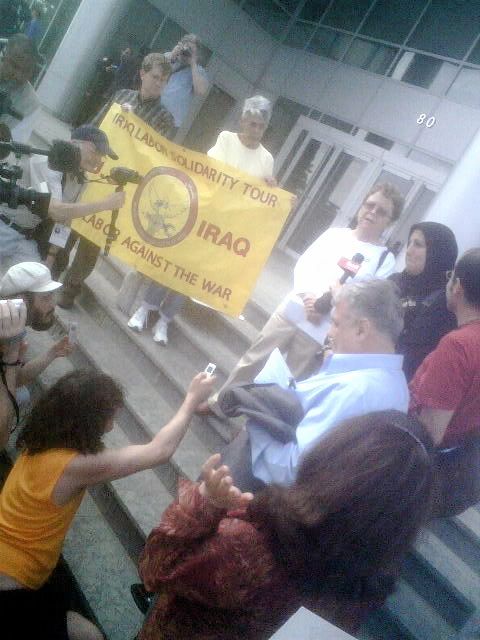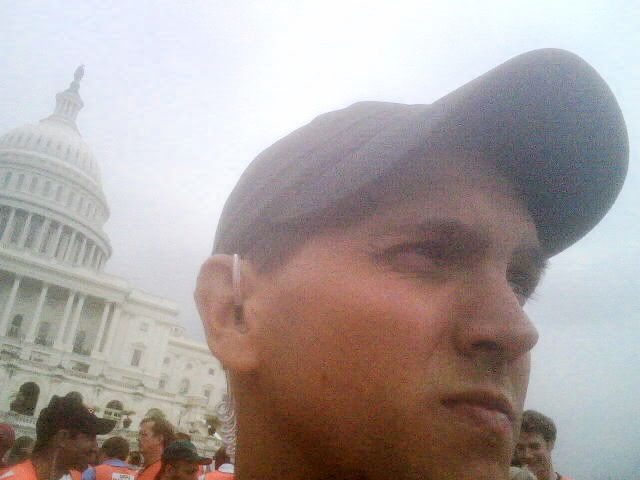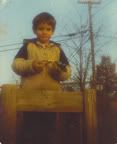
It's curious that I've never quite entirely gotten my head around my love affair with the District. The best I've been able to deduce, it has something to do with this being the first place I've ever chosen to live, which on the surface doesn't seem like a terribly astute observation. After all, nothing is outside of the market, these days. And in turn, the list of things we've been conditioned to file under "choice" (usually without so much as blinking) is nearly incalculable. More to the point, the degree to which most of us have internalized that logic is pretty difficult to overstate. So, I once caught myself laughing at my tentative conclusion, thinking "Well, who didn't chose to live someplace at one point or another? And what about that rite of passage would necessarily give rise to this sort of love affair?"
It wasn't for lack of trying, either. I'd quit a job of four years, left a rather sweet living arrangement, and more or less uprooted my entire life in a short-lived move to Seattle some six years ago. And while a number of factors (personal life, job prospects, etc) saw me making my way eastward again, there was undeniably a sense of exile operative in it all. Just months before I'd left, I'd been part of a guerilla poster campaign the AFL-CIO had hired a few of us to carry out in opposition to Bush's sweeping elimination of workplace ergonomics standards; an action that elicited a rather irate phone call from the White House. When the invasion of Afghanistan began in late 2001, on the other hand, I was standing in a random crowd of strangers in one city, in one state, on the far coast. The contrast, the isolation and sense of impotence was considerable, to say the least.
Certainly, during the years I spent touring heavily, the combination of dislocation and the sheer multiplicity of gifts disparate geographies offer often left me with the sense that the District was not necessarily disproportionately stacked in any way that would compel me to live here. Buenos Aires, Oslo, Stockholm, Leeds, Strousbourg, Barcelona, Bologna all struck me as places in which I could both lose myself and perhaps unearth an as yet unknown part of that self. And that sort of frightened me. It cast into instability and incoherence my unflinching devotion to and romance with place. This place, in particular.
There's a rather understated function to distilling a given scenario (real or hypothetical) down to its actual requirements, or what its realization demands. Growing up, we get a healthy dose of terror over the onset of each forthcoming stage of our lives, most of which has everything to do with the interests of those speaking at these given moments, and very little (if anything) to do with our fulfillment. I've remarked on this in the past a bit (in a previous post), but it bares returning to for a moment, given that it offers something to one's relationship with place; it offers something my relationship with this place.
Back in May, there was a flyer hanging in the hallway of a midtown Memphis coffeehouse, advertising a multi-bedroom apartment with all sorts of amenities -- nine foot ceilings, the works. I don't remember the exact price, but it was a fraction of the north Dupont apartment in which I've recently taken up residence. And in all fairness, midtown Memphis isn't necessarily anything to sneeze at. Indeed, a vibrant little progressive community is emerging there; one we stumbled onto by sheer accident, attempting to track down a veg Thai restaurant we'd googled before getting on the plane that morning. A queer community center, a used bookstore that seems to serve as a space for homegrown artists, and a massive coffeehouse/lounge not terribly unlike Pensacola's End of the Line (for those who've been there) or the Langdon Street Cafe in Montpelier. And that's really just what we managed to poke our heads into over the course of an hour or so. And not unlike Pensacola and Montpelier, the price is certainly right for anyone who isn't finding our economy terribly resonant with their life aspirations.
And that's precisely where I think that adolescent terror would intuitively land me; a disproportionate and over-determinative role for the impulse to economize life, as though this or that decision is compelling or worthwhile by virtue of how it enables me to accumulate. Moreover, the manner in which that practice of accumulation essentially constitutes our method of evaluating both the viability and progress of our lives. The idea that one might organize one's decisions, livelihood, financial prospects etc. around a commitment to place, rather than the reverse, is virtually off the table... Largely because it's been structurally eliminated as an option. Which brings me back to my first point: Everything has been absorbed by the market. And it stabs in both directions; we gravitate toward and settle in those places that pose the fewest financial challenges, which in turn vindicates accumulation as an emotional/spiritual/intellectual health index, leaving the general model intact.
In all of this, of course, we're abiding the boundaries of fulfillment, not survival; the operative consideration for most, and the "invisible hand" that gives rise to the utterly vacuous immigration debate dominating the airwaves, these days. Brutal a blueprint it was, central to market economics (as elaborated by Adam Smith) was the principle that capital cannot be free unless labor is free. In other words, if capital can cross borders, labor must be able to, as well. Funny that no one mentions that, no? Odds are the corporate world would shit its pants if it woke up to a world where it was commonly held that if business can cross borders in search of lower wages, workers can cross them in search of higher ones. Ultimately, the racist social dimension of the conservative political orientation that businesses have traditionally counted on is coming back to bite it in the ass. The intuitive and organic migration patterns exacerbated by the acceleration of neo-liberal economic policies in the last few decades have begun to threaten the racial and ethnic dreamland certain (dominant) sectors of our population have concocted over the years. And true to history, the most vulnerable, battered, and disenfranchised are getting the business end of it.
But I digress...
I've been in and out this summer (hence my lack of activity, here). Down south for a family wedding. Up to Montreal for an IAS board meeting. Rehoboth for a spontaneous day at the beach. Baltimore just for the hell of it (and an Iraq Vets Against the War event). And I was only spared a long weekend in Buenos Aires due to pretty gratuitous miscommunication. And yet I wake up rather early each morning (usually to feed the cats) and have to read myself back to sleep for fear I'll wander out the door to watch the sun come up in another neighborhood (or on the SW waterfront, watching planes taking off from National); that I'll lose track of responsibilities (more than I already have) indulging this place, this geography that animates and casts me into relief... That I'll let go of the reins, seduced by a stage set that (by all reasonable standards) should've scared the shit out of me, the moment I opted to live here. Occasionally, these passing flashes of clarity are disorienting. I wonder (sometimes in terror, usually in the middle of the night) why I'm not more inclined to economize life; why I'm not more driven by the things I'll have to leave behind when the time comes.
A friend of mine recently married, and entered his 30th year. Not surprisingly, he remarked on the shift in perspective that comes with both, mostly an effect of age. I (also not terribly surprisingly) resorted to self-deprecation, invoking that I, too, would be joining him in the ranks of the big Three-Oh momentarily, and enjoy (by virtue of my divorce) that oh-so-coveted status of Damaged Goods, to boot. "Yeah, but you've done a lot of shit pre-30, bro", he replied. And I don't think that observation is immune from the juxtaposition of survival and fulfillment; if anything, that tension is spilling out the seams. And perhaps I've taken up in the District out of what it allows me to fulfill, to the tune of Audre Lorde imploring that "We were never meant to survive." And perhaps it's only when I'm abruptly dragged from sleep that survival catches up with me and pulls the air from my lungs for a moment.
No matter. It's enough to pass those moments with Seymour Hersh (his writing, anyway) or the off bike ride across the Ellington Bridge. Better, one thinks, to be tormented by one's precarious relationship with survival, than one's unraveling dialog with living. I can survive when I'm dead.




